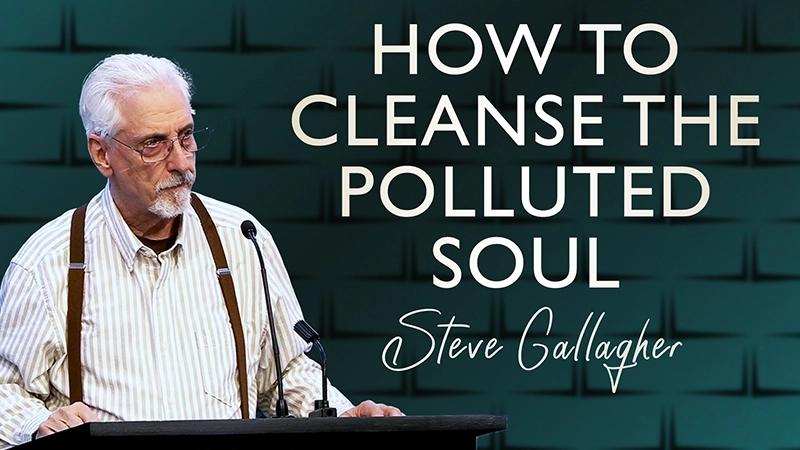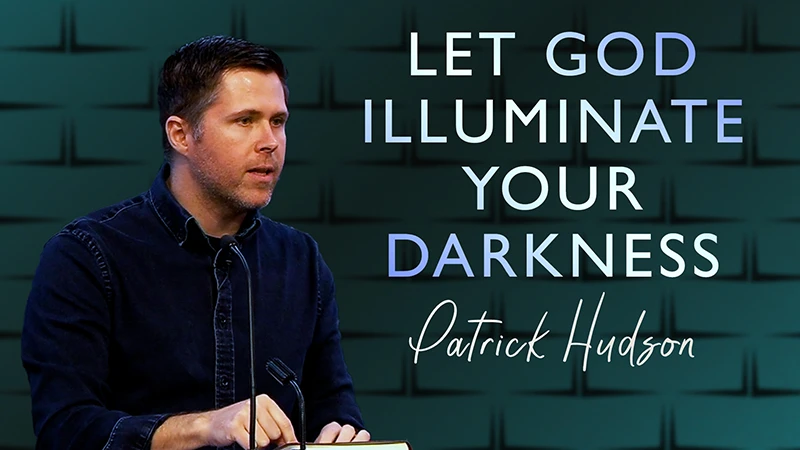
Hopelessness in the Life of the Sex Addict
In this interview with long-time Residential Program counselor, Ken Larkin, we discuss the hopelessness that often grips sex addicts. Hopelessness can lead to self-pity and despair, which will prevent us from finding victory over sexual sin and create a barrier between us and God.
Ken, as we continue to sketch out the profile of a typical sexual addict in the church, we've come to this idea of just feeling hopeless. I know a lot of people are there, and I wanted to start by playing for you the description Pastor Steve gave of this particular characteristic:
“Living in spiritual defeat over a prolonged period of time causes the man to waffle back and forth between an inflated sense of his own spirituality and a feeling of overwhelming hopelessness. Part of the problem is that for years he has run to books, seminars and support group meetings in the hope that he can overcome his problems with a minimal amount of effort. His dilemma has been exacerbated because he has gotten his hopes up many times over the years by the exaggerated claims of people offering help. ‘Read this book it's powerful;’ ‘this seminar will change your life!’ He dutifully reads those books and attends those seminars but finds that nothing is changed. Each promising situation that doesn't bring victory leaves him more cynical. After a while he even becomes skeptical about the promises held out by Scripture.”
{{blog-si="/blog-ads-storage"}}
Ken, Pastor Steve mentioned that people tried different kinds of things unsuccessfully to find freedom oftentimes. What kinds of things have you known for people to try in order to get free from sexual sin?
Really the full gamut; I mean first of all just sheer willpower—just trying hard enough. And then as pastor Steve mentioned self-help books, materials, conferences, seminars, support groups, accountability; different types of therapists and counselors; psychoanalysis: going to see a psychiatrist or psychologist.
Internet filters will be another one: “if I can just put a filter on the device that will help me.” Even getting rid of a phone or a computer or a laptop. And even going the spiritual route: praying more, getting more into the Bible; some guys have even fasted for extended periods hoping to get free through those efforts.
When Christians aren't seeing change and they feel this hopelessness because of their failure, I'm wondering what's really the root of that because I think, maybe, some people are hopeless because they know they failed God, whereas other people it's more because they feel like God failed them.
So, first, how common would you say it is for addicts to feel hopeless in the sense that they have this intense guilt about their failure that's constantly plaguing them?
It's very common and as a matter of fact the reason why it's there is because they have a real, objective guilt. They are living a lifestyle of sin, so they are guilty before a holy God; their conscience and the Word of God testifies to this fact. Their lifestyle does not line up with the truth that they know to be true from God's Word.
Yeah, I imagine it would be very easy to get into that place, but you've observed this quite a lot. What other dynamics would you say kind of feed into that mentality and reinforce that guilt getting so strong in someone's life?
Well, we're talking about hopelessness, so it's not just guilt—the fact that I'm guilty—but it's like this nagging thing that says “I'm never going to be out from under this guilt,” and of course when you're living in habitual sin, you're focusing on yourself and what you want, your desires. So they're caught up in their own little world and are stuck on themselves instead of turning to God. And with that the enemy of our souls, the devil, will try to feed on that and actually lead someone into condemnation, that there's no way out of that guilt. And then instead of turning to God, they turn to despair and hopelessness.
When you're talking about this whole topic of guilt, we all would say that's a good thing—someone ought to feel some degree of guilt about what they've done—but it seems like you're saying it can actually overwhelm someone to the point where they're paralyzed.
Yeah that's correct.
You touched at the end there about people feeling almost under accusation from the enemy. I have talked to people like that; people who really struggle with this dark spiritual mindset. They are doubting that God loves them; they even might be having blasphemous thoughts about God and really feeling bad about that. Where does that kind of thing come from?
Well it's definitely from the enemy. You can't rule out the person's own sinful nature: the flesh. If you're living in sin and God's telling you that you need to live differently, and you're rebelling, it is going to be natural to have antagonistic thoughts against God that might escalate into blasphemous thoughts, accusing God or cursing God. But ultimately, I believe it's the enemy. And the enemy would do anything he can to keep someone from God and from really knowing the freedom that's found in Christ.
All right then let's flip it around maybe and talk about the other type of person. Tell us maybe about the kind of guy that you counsel regarding sexual sin who feels more like God's the one that has failed them. If they're in that place, why do they feel that way and where does that end if they keep going down that path?
Well what they typically will say is "I've cried out to God, I've prayed, I've done all the right things, yet God still hasn't come through for me"; they blame God that they're still in their addiction. Now of course this could also be an excuse that they really haven't come to the place where they want to be free from their sin because they still love their sin and God is really just a scapegoat: "well God hasn't delivered me," but all along their still holding onto their sin. This mindset could be an excuse that will lead to staying in your sin. You're not repenting, you're not changing, you're actually staying in your sin and eventually, maybe, deluding yourself to think it's OK.
The other reaction if you're blaming God is, obviously, you can become angry with God, bitter toward God, even hating God or turning away from God because you've tried to turn to him and he didn't come through for you, so what other recourse do you have? "God isn't helping me, I'm going to find help somewhere else." Some men just give up and go over to their sin and live a lifestyle of perpetual sin.
You're describing a lot of different mindsets and a lot of different places that people come to but the same result: this hopelessness that comes over them for a variety of different reasons. Now I know that Pastor Steve also mentioned that, for these kinds of Christians, they'll often end up even doubting the scripture and all the promises that are there about change. We know that's wrong, but why would you say someone who claims to be a Christian could get to that place where they're convinced that the answers of scripture are just not going to work for them?
I would say a lot of it has to do with guys that have been professing to know Christ, saying they're Christians, but they've been in sin for so many years that an unbelief has settled into their hearts. A lot of them have, on some level, tried to hold on to the promises of God's Word; maybe memorized scripture, quoted scripture and stood upon it, yet they're still bound to their sin. And the reason they're bound is because they're trying to deal with the symptoms and have never really dealt with the roots.
And, ultimately, we find these guys have never really surrendered their lives to God, and they're trying to be free from their sin without really allowing God to do that work in their lives. The reason why that unbelief is there is because they've been really trying to do things themselves, and that lends itself to failure because you're not going to save yourself. I mean it's impossible for someone to free themselves from their sin.
OK so you're saying there's been something missing in their spiritual journey even if they've tried different, important steps like seeking God to a degree. Do you think they see that? Do some of them sense there's something still missing or oftentimes not?
A lot of them do but a lot of them don't. And they've been stuck for so many years and they've been living in this darkness (because you can't live in habitual sin and not at some level be in darkness) and they don't see a way out. Some of them have gone to the point where they don't really even see that they have much of a problem; they've minimized it to the point where it's one small, little problem, when actually their whole lives are in disarray.
You know it's interesting—we're kind of going on a tangent here—but, what you're saying is on the one hand they're hopeless because they feel like this is overwhelming their life, but at this very same time, you're having to deal with the fact that they're missing the rest of their life and thinking that this is the only issue that they have. How do you account for that paradox in their thinking?
There's a lot of different factors. One of them is they may not really understand what true Christianity is, and what God is really calling them to, and they've never really had that deep heart change where their whole life has been turned over to the Lord where they've experienced true repentance, true brokenness for their sin, and God has been able to revamp their life from the inside out. So all they've been doing is what our culture basically teaches us: to deal with the symptoms. And they've never dealt with the fundamental roots of their sin, which is their own pride and selfishness.
Well I know we can't get too far into this topic, but I did at least want to touch on the area of psychology since I'm sure a lot of guys come to you who are holding on to various psychological concepts. For you, where does psychological thinking fit into this topic of hopelessness.
Well, I would say psychology, as well as the other means people have used to seek freedom, actually foster hopelessness. The reason why I say that is psychology tends to promote a victim mentality—number one—"it's someone else's fault," or "you're a victim of your environment, other people." And the other thing is "once an addict, always an addict."
They may be great at identifying problems in telling you what's wrong with you, but they never deal with the root issues, and they don't offer any true solutions for lasting change. There's no hope, there's no way out; "once a sexual addict always a sexual addict." And that fosters extreme hopelessness in the end.
Any other things you want to touch on that you have found contribute to this hopelessness? Things you would point out to leaders who are listening and need to be looking for the problems that are in those they counsel.
Well one of the interesting things I've found is a lot of guys that seem to be the model example of a good Christian—have given themselves to ministry, are involved in all types of activities in church, and it seems like they're doing great spiritually—have a secret double life and they're living in sin. They justify their sin and think they're going to overcome their sin if they just throw themselves into ministry or maybe into work, but freedom still eludes them.
















